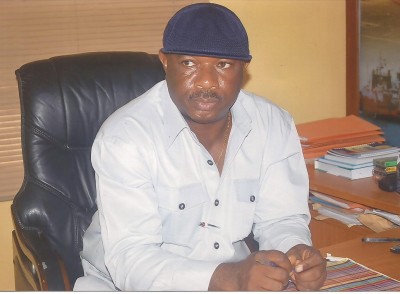
By Kenneth Jukpor
Recognizing the immense contributions of truckers to the nation’s trade, the Executive Secretary of the Nigerian Shippers Council (NSC) Mr. Hassan Bello has stated that in 18 months, the Nigeria port sector and transportation at large would be boosted with the emergence of modern transport systems at the ports, to include electronic call-up systems for trucks, truck transit parks (TTP), ETC.
It is true that traders, farmers, distribution companies and all stakeholders involved in the business of importation and exportation would benefit from this modern transport system.
When operational, there is no doubt that it will resolve the perennial gridlock problem emanating from trucks and tankers that obstruct the roads leading into Apapa and spill over to adjoining roads in the metropolis.

However, one could begin to wonder how soon this modern transport system for port operations would be actualized, with several plans having started without a meaningful progress in the last decade.
Hassan Bello who was speaking when the executives of the Association of Maritime Truck Owners (AMATO), had alluded that the Nigerian economy rests on truckers for the distribution of cargo that comes into the ports.
“I can put the truckers role in national trade as 70% and I’m been very conservative. It is unfortunate that the Nigerian government hasn’t paid sufficient attention to truckers, despite your very important role but at Shippers’ Council, we recognize your relevance and that is why we reached out to invite you for this meeting” Bello said.
“We know the importance of trucking and truckers to a nation’s economy, especially in Nigeria where the other modes of evacuating cargoes from the ports haven’t been fully harnessed. This is why we continue to accord you the respect that you deserve. However, we need modern traffic systems at the ports and there must be holding-bay and other avenues for moving cargoes out of the ports.”
Meanwhile, highlighting the importance of truck parks and operational electronic call-up systems for trucks at the ports, the Founder of the National Association of Government Approved Freight Forwarders (NAGAFF) Dr. Boniface Aniebonam, recalled that NAGAFF started talking about this about fifteen years ago.
“There is a need to develop truck parks and to create a system that would ensure that trucks only come in when they are needed. This is something NAGAFF started campaigning for more than fifteen (15) years ago. This would also ensure that trucks no longer park on the port access roads. Despite the bad roads, the haphazard parking of trucks has been a major part of the problems with the port access roads. It doesn’t matter where the truck park is located, it could be in Apapa or somewhere far away but the issue is that the trucks shouldn’t be around the port premises until they are needed” Aniebonam said.
However, he stressed that the nation should also be concerned about the wellbeing of the truck drivers who spend days on the road, noting that ‘they are also humans and we should also think about the health implication and economic impact this traffic has on them and their businesses. Those who get stuck in traffic in their private cars complain the most but they forget that the boys in those trucks who sit there for about three (3) or more days are human beings who are also doing their business”.
According to Aniebonam, since the Nigerian ports are at the last stage of development where factories continue springing up, the government should be concerned about providing the requisite spaces for these trucks to be parked. Hence, the need for truck transit parks to be developed.
Aniebonam also expressed skepticism over Hassan Bello’s 18 month duration for the commencement of the anticipated electronic truck call-up system and e-truck entry at the nation’s ports
Recall that one of the lead speakers at the recent national conference on the development of TTPs in Nigeria, Dr. Paul Clark noted that a further development of Nigeria’s transportation system would occur with the development of truck transit parks as the five Trans-African Highways either pass or terminate in Nigeria.
Clark posited that the benefits for the Nigerian economic development would mean; planning ahead for strategic development corridors using the United Nations (UN) strategic development initiatives especially at border crossing points, planning ahead for the integration of national and regional economies of the 21st century, planning ahead for the easy movement of people, capital, goods and services within the country, planning ahead for the free movement of people, capital, goods and services within the ECOWAS region and the African continent.
It also provided opportunity for states to link their cities to planned routes and potential future routes for economic benefit, opportunities for small and medium enterprises to access new markets within Nigeria, West Africa and Africa as a whole. This means expansion of the Nigeria economy at all levels including rural initiatives.
“So recognizing Nigeria’s strategic importance it must double its effort not to lag behind whilst other African regional economies who are already forging ahead to implement vehicles parks in their countries connecting to the Trans African Highway networks”, Clark said.
However, earlier in his speech, the AMATO Chairman had called the attention of the Executive Secretary to a proposed strategic location for a truck park which could accommodate over 1500 trucks.
According to the AMATO boss, while the nation was gearing up for the development of truck transit parks, the Lagos ports could fare better with an impromptu truck park to reduce the number of trucks on the port access roads.
However, he lamented that the owner of the prized facility was demanding an exorbitant sum of N10billion, whilst the owner has also insisted on outright payment.
Chief Remi, who revealed that the proposed truck park is around Orile and 2-3km away from the Apapa and Tin Can ports, also stated that the provision of a truck park would eliminate more than 50% of the problems associated with trucking at the ports.
“The property would have to be purchased and we don’t have the amount the owners are demanding. The place I am talking about is between Apapa and Orile. It is about 2-3km to the Apapa and Tin Can ports. We are looking up to the Federal Government to use their might to acquire the facility. I am impressed with the kind of synergy that is between the Lagos State government and NPA on this issue. The last meeting we held had the General Manager of the Western Ports present” he said.
This new modus operandi at the nation’s ports will help to reduce the cost of doing business in the ports, thereby attracting more imports/exports and the financial institutions and investors will be encouraged to invest in re-fleeting the trucks because the wear and tear on them will reduce significantly.
With the introduction of a tracking device on the trucks, the freight forwarders will be able to monitor trucks conveying containers and general cargoes, but how soon can this system begin. Can we take the ‘good’ Hassan Bello’s word that in 18 months we would be amazed to see modern electronic operations at Nigerian ports? Well, it doesn’t hurt to be optimistic, does it?
 MMS PLUS NG – Maritime, Aviation, Business, Oil and Gas News Online Newspaper with coverage in Maritime, Oil and Gas, Aviation, Power and Energy as well as Financial News
MMS PLUS NG – Maritime, Aviation, Business, Oil and Gas News Online Newspaper with coverage in Maritime, Oil and Gas, Aviation, Power and Energy as well as Financial News









